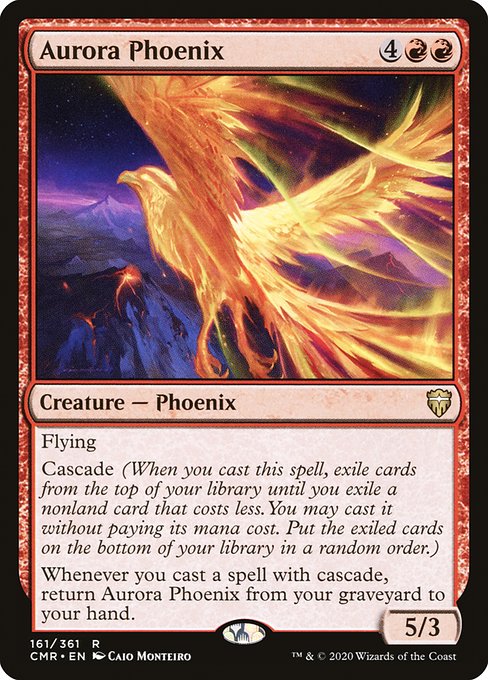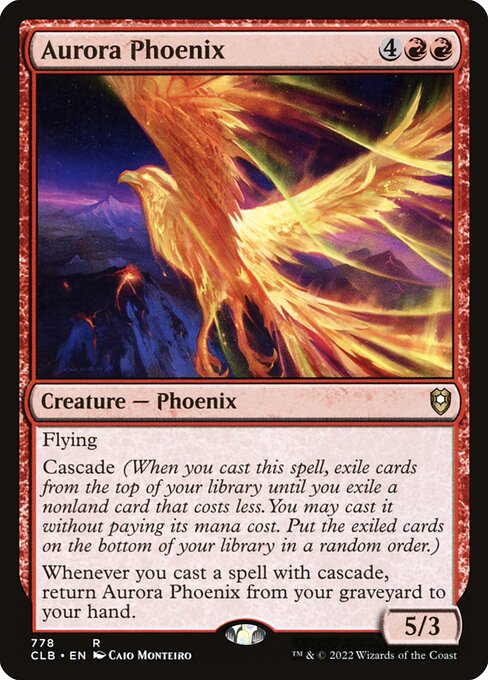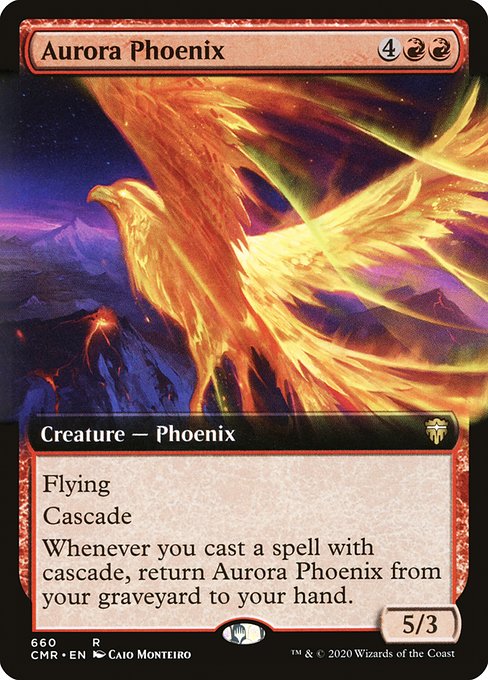Aurora Phoenix
Creature — Phoenix
Flying
Cascade (When you cast this spell, exile cards from the top of your library until you exile a nonland card that costs less. You may cast it without paying its mana cost. Put the exiled cards on the bottom of your library in a random order.)
Whenever you cast a spell with cascade, return Aurora Phoenix from your graveyard to your hand.
Cascade (When you cast this spell, exile cards from the top of your library until you exile a nonland card that costs less. You may cast it without paying its mana cost. Put the exiled cards on the bottom of your library in a random order.)
Whenever you cast a spell with cascade, return Aurora Phoenix from your graveyard to your hand.
5/3
standard
future
historic
gladiator
pioneer
explorer
modern
legacy
pauper
vintage
penny
commander
brawl
alchemy
paupercommander
duel
oldschool
premodern
Rulings
Aurora Phoenix's last ability triggers only if it's in your graveyard immediately after you finish casting the spell with cascade.
An ability that triggers when a player casts a spell resolves before the spell that caused it to trigger. It resolves even if that spell is countered.
The cascade ability of the spell you cast and Aurora Phoenix's return ability can be put on the stack in either order. If you return Aurora Phoenix to your hand first, you do so before exiling any cards for the cascade ability. If the cascade ability resolves first, the spell you cast because of that cascade ability will resolve before you return Aurora Phoenix to your hand. Either way, this all happens before the original spell with cascade resolves.
Cascade triggers when you cast the spell, meaning that it resolves before that spell. If you end up casting the exiled card, it will go on the stack above the spell with cascade.
A spell's mana value is determined only by its mana cost. Ignore any alternative costs, additional costs, cost increases, or cost reductions.
If a spell with cascade is countered, the cascade ability will still resolve normally.
When the cascade ability resolves, you must exile cards. The only optional part of the ability is whether or not you cast the last card exiled.
Due to a recent rules change to cascade, not only do you stop exiling cards if you exile a nonland card with lesser mana value than the spell with cascade, but the resulting spell you cast must also have lesser mana value. Previously, in cases where a card's mana value differed from the resulting spell, such as with some modal double-faced cards or cards with an Adventure, you could cast a spell with a higher mana value than the exiled card.
If the card has in its mana cost, you must choose 0 as the value of X when casting it without paying its mana cost.
You exile the cards face up. All players will be able to see them.
If you cast a card “without paying its mana cost,” you can't choose to cast it for any alternative costs. You can, however, pay additional costs. If the card has any mandatory additional costs, you must pay those to cast the card.
The mana value of a split card is determined by the combined mana cost of its two halves. If cascade allows you to cast a split card, you may cast either half but not both halves.
An ability that triggers when a player casts a spell resolves before the spell that caused it to trigger. It resolves even if that spell is countered.
The cascade ability of the spell you cast and Aurora Phoenix's return ability can be put on the stack in either order. If you return Aurora Phoenix to your hand first, you do so before exiling any cards for the cascade ability. If the cascade ability resolves first, the spell you cast because of that cascade ability will resolve before you return Aurora Phoenix to your hand. Either way, this all happens before the original spell with cascade resolves.
Cascade triggers when you cast the spell, meaning that it resolves before that spell. If you end up casting the exiled card, it will go on the stack above the spell with cascade.
A spell's mana value is determined only by its mana cost. Ignore any alternative costs, additional costs, cost increases, or cost reductions.
If a spell with cascade is countered, the cascade ability will still resolve normally.
When the cascade ability resolves, you must exile cards. The only optional part of the ability is whether or not you cast the last card exiled.
Due to a recent rules change to cascade, not only do you stop exiling cards if you exile a nonland card with lesser mana value than the spell with cascade, but the resulting spell you cast must also have lesser mana value. Previously, in cases where a card's mana value differed from the resulting spell, such as with some modal double-faced cards or cards with an Adventure, you could cast a spell with a higher mana value than the exiled card.
If the card has in its mana cost, you must choose 0 as the value of X when casting it without paying its mana cost.
You exile the cards face up. All players will be able to see them.
If you cast a card “without paying its mana cost,” you can't choose to cast it for any alternative costs. You can, however, pay additional costs. If the card has any mandatory additional costs, you must pay those to cast the card.
The mana value of a split card is determined by the combined mana cost of its two halves. If cascade allows you to cast a split card, you may cast either half but not both halves.
Rulings
Aurora Phoenix's last ability triggers only if it's in your graveyard immediately after you finish casting the spell with cascade.
An ability that triggers when a player casts a spell resolves before the spell that caused it to trigger. It resolves even if that spell is countered.
The cascade ability of the spell you cast and Aurora Phoenix's return ability can be put on the stack in either order. If you return Aurora Phoenix to your hand first, you do so before exiling any cards for the cascade ability. If the cascade ability resolves first, the spell you cast because of that cascade ability will resolve before you return Aurora Phoenix to your hand. Either way, this all happens before the original spell with cascade resolves.
Cascade triggers when you cast the spell, meaning that it resolves before that spell. If you end up casting the exiled card, it will go on the stack above the spell with cascade.
A spell's mana value is determined only by its mana cost. Ignore any alternative costs, additional costs, cost increases, or cost reductions.
If a spell with cascade is countered, the cascade ability will still resolve normally.
When the cascade ability resolves, you must exile cards. The only optional part of the ability is whether or not you cast the last card exiled.
Due to a recent rules change to cascade, not only do you stop exiling cards if you exile a nonland card with lesser mana value than the spell with cascade, but the resulting spell you cast must also have lesser mana value. Previously, in cases where a card's mana value differed from the resulting spell, such as with some modal double-faced cards or cards with an Adventure, you could cast a spell with a higher mana value than the exiled card.
If the card has in its mana cost, you must choose 0 as the value of X when casting it without paying its mana cost.
You exile the cards face up. All players will be able to see them.
If you cast a card “without paying its mana cost,” you can't choose to cast it for any alternative costs. You can, however, pay additional costs. If the card has any mandatory additional costs, you must pay those to cast the card.
The mana value of a split card is determined by the combined mana cost of its two halves. If cascade allows you to cast a split card, you may cast either half but not both halves.
An ability that triggers when a player casts a spell resolves before the spell that caused it to trigger. It resolves even if that spell is countered.
The cascade ability of the spell you cast and Aurora Phoenix's return ability can be put on the stack in either order. If you return Aurora Phoenix to your hand first, you do so before exiling any cards for the cascade ability. If the cascade ability resolves first, the spell you cast because of that cascade ability will resolve before you return Aurora Phoenix to your hand. Either way, this all happens before the original spell with cascade resolves.
Cascade triggers when you cast the spell, meaning that it resolves before that spell. If you end up casting the exiled card, it will go on the stack above the spell with cascade.
A spell's mana value is determined only by its mana cost. Ignore any alternative costs, additional costs, cost increases, or cost reductions.
If a spell with cascade is countered, the cascade ability will still resolve normally.
When the cascade ability resolves, you must exile cards. The only optional part of the ability is whether or not you cast the last card exiled.
Due to a recent rules change to cascade, not only do you stop exiling cards if you exile a nonland card with lesser mana value than the spell with cascade, but the resulting spell you cast must also have lesser mana value. Previously, in cases where a card's mana value differed from the resulting spell, such as with some modal double-faced cards or cards with an Adventure, you could cast a spell with a higher mana value than the exiled card.
If the card has in its mana cost, you must choose 0 as the value of X when casting it without paying its mana cost.
You exile the cards face up. All players will be able to see them.
If you cast a card “without paying its mana cost,” you can't choose to cast it for any alternative costs. You can, however, pay additional costs. If the card has any mandatory additional costs, you must pay those to cast the card.
The mana value of a split card is determined by the combined mana cost of its two halves. If cascade allows you to cast a split card, you may cast either half but not both halves.
Your collection? Your decks?
Want to manage your collection and/or create decks?



 0
0
 0.18€
0.18€
